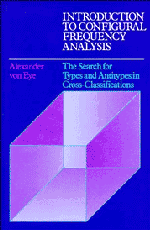 Introduction to Configural Frequency Analysis
Introduction to Configural Frequency Analysis Book contents
- Frontmatter
- Contents
- Preface
- Part I Concepts of configural frequency analysis
- Part II Applications and strategies of CFA
- 4 Global models of CFA: applications and examples
- 5 Regional models of CFA: applications and examples
- Part III Methods of longitudinal CFA
- Part IV Strategies of CFA and computational issues
- Appendix A Computational issues. The estimation of tail probabilities for the standard normal and the F distributions
- Appendix B Estimation of expected frequencies in 2 × 2 × 2 tables under the assumption that main effects and first order interactions exist
- Appendix C Critical alpha levels under Holm adjustment for up to 330 cells and a priori alphas 0.05 and 0.01
- References
- Subject index
- Author index
4 - Global models of CFA: applications and examples
from Part II - Applications and strategies of CFA
Published online by Cambridge University Press: 04 August 2010
- Frontmatter
- Contents
- Preface
- Part I Concepts of configural frequency analysis
- Part II Applications and strategies of CFA
- 4 Global models of CFA: applications and examples
- 5 Regional models of CFA: applications and examples
- Part III Methods of longitudinal CFA
- Part IV Strategies of CFA and computational issues
- Appendix A Computational issues. The estimation of tail probabilities for the standard normal and the F distributions
- Appendix B Estimation of expected frequencies in 2 × 2 × 2 tables under the assumption that main effects and first order interactions exist
- Appendix C Critical alpha levels under Holm adjustment for up to 330 cells and a priori alphas 0.05 and 0.01
- References
- Subject index
- Author index
Summary
Zero order CFA
Zero order CFA (Lienert and von Eye 1984a, 1985; von Eye and Lienert, in press) is applied to determine if there are effects in a given data set. To answer this question, expected frequencies are estimated under the following assumptions:
(1) There are no main effects; the variables under study are distributed according to a joint uniform sampling distribution.
(2) There are no interactions; the variables under study are totally independent.
In other words, zero order CFA assumes no effects whatsoever in the contingency table under study. Deviations from an overall uniform distribution are assumed random in nature. Therefore, zero order CFA can be viewed as an omnibus test sensitive to any kind of effect. Types in zero order CFA indicate that main effects, interactions, or both have led to agglomerations of cases in certain configurations. These agglomerations are similar to clusters of cases that are identified with, for example, Ward's (1963) method. Both CFA and Ward's method define clusters as spatially close cases. Both methods identify agglomerations of cases without reference to underlying main effects or interactions of variables. Because of this, zero order CFA is also called configural cluster analysis, and zero order types are called clusters. Accordingly, anticlusters indicate relatively sparsely frequented sectors of the data space that are due also to main effects or interactions.
- Type
- Chapter
- Information
- Introduction to Configural Frequency AnalysisThe Search for Types and Antitypes in Cross-Classification, pp. 63 - 81Publisher: Cambridge University PressPrint publication year: 1990
